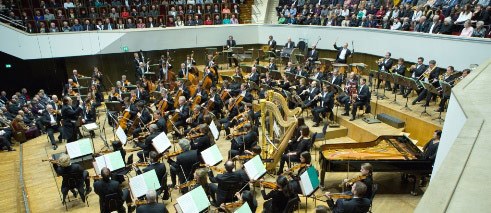Introduction
The state of classical music in Germany

Germany is perceived as a “country of music”. The reason lies in its cultural heritage and the concentration of orchestras, choirs, opera and concert halls, festivals, and education and advanced training opportunities which are unrivaled anywhere else in the world. Fostering this rich variety is essential.
Germany is known as the land of poets and thinkers, and this includes musicians as well. Händel and Bach, Beethoven and Brahms, Schumann and Schütz, Wagner and Hindemith, Weill and Stockhausen – hardly an era has passed when Germany has not spawned a world-renowned classical musician. Only the Austrians, Italians and French can compete with Germany in this regard, although such high self-praise is always problematic. Unfortunately, in the minds of adamant patriots, intellectual competence usually stops abruptly at the national border.
All the same, as a country situated in the middle of Central Europe, Germany has continually held the best cards. The country was always densely settled. There were large cities that automatically attracted musicians, either permanently or long enough for an inspiring stay. Royal houses booked the finest performers in grand style. Even the churches hired musical help to spread God’s word. And sometimes it was even regular citizens themselves who sought to make music without licence from higher authorities. The history of a country is reflected in its musical history; democracy usually (but not always) has a place in musical scores.
Impressive wealth, tight coffers
For centuries the fostering of culture in Germany has been widely dispersed, and not the burden of the state. And it is no different with music. The responsibility falls to the cities, communities and to the federal states. How else could it be? No country could look after the more than 130 orchestras, all of which are rely on funding. This reality has both its advantages and disadvantages. In federal states with few large cities, such as Hesse and Bavaria, resources are easier to organise than in North Rhine-Westphalia, where there is an opera house, a concert hall, an orchestra, countless choirs or at least a music festival off every fourth exit of the Autobahn. Politicians are proud to present foreign visitors with this impressive wealth of musical offerings. But when it comes to the distribution of scant financial resources in these times of tight coffers, nothing escapes scrutiny.The United States provides evidence of what results when the public sector is not involved in cultural promotion: the death of one orchestra after the next. Those who want to limit the state’s obligation to promote culture have forgotten that culture is both a hard and soft location factor for a community‘s desirability. On an evening out, one goes not just to the opera, but also to a restaurant, takes the train and beforehand buys a new suit or a new little black dress. And of course a young family is drawn to a city with a music school. But be careful when moving: many schools have quietly cut their music programmes.
The deeply engrained structure of the music profession is spawning emulation – and is buttressed at an even deeper level. The network of music schools and music universities is extremely dense, and those who attend one of these institutions are initially awed by the multinational family of which they find themselves part. But then the ethnic diversity seems quite natural: those from China, Uzbekistan, Peru and Syria who come to Germany to learn surely seek to feel the aura of the great masters. But they also want to learn each principle that is exported around the globe while embodied in German craft, not just in football: diligence, thoroughness, discipline, tradition.
Lively Music Scene
This temple of art and art commerce has given rise to a considerable network of institutions that nourishes the music industry and provides its infrastructure. Numerous agencies supply promoters with artists to perform in both large and small presentation formats – as soloists, chamber musicians, conductors, Lieder singers. Several publishers print the sheet music from which the musicians then play. Several companies build the instruments on which the music is played. And the Artists' Social Welfare Fund and the Society for Musical Performing and Mechanical Reproduction Rights make sure the artists are paid the appropriate fees for their work. But for music to be heard, it needs a hall with atmosphere. In the past 20 or 30 years new concert halls have been built in all large cites that make the Berliner Philharmonie seem like an ancient amphitheatre – and it’s not even 50 years old. The example of the Hamburger Elbphilharmonie shows how a concert hall can act as the Tower of Babel and disunite an entire city, despite the fact that all parties have such high hopes for the building. It is currently estimated that this object of prestige will require tax payer contributions totalling several hundred million euros.Everything has come quite naturally to the German music industry over the years. But now we are noticing a gap between demand and financial feasibility, and we are detecting the loss of that which has become dear to us. Classical music critiques are becoming ever more rare in the daily newspapers. Some even consider it a crisis in the land of poets and thinkers. It’s good form in Germany to pronounce classical music dead, but upon close examination, the patient seems very much alive.